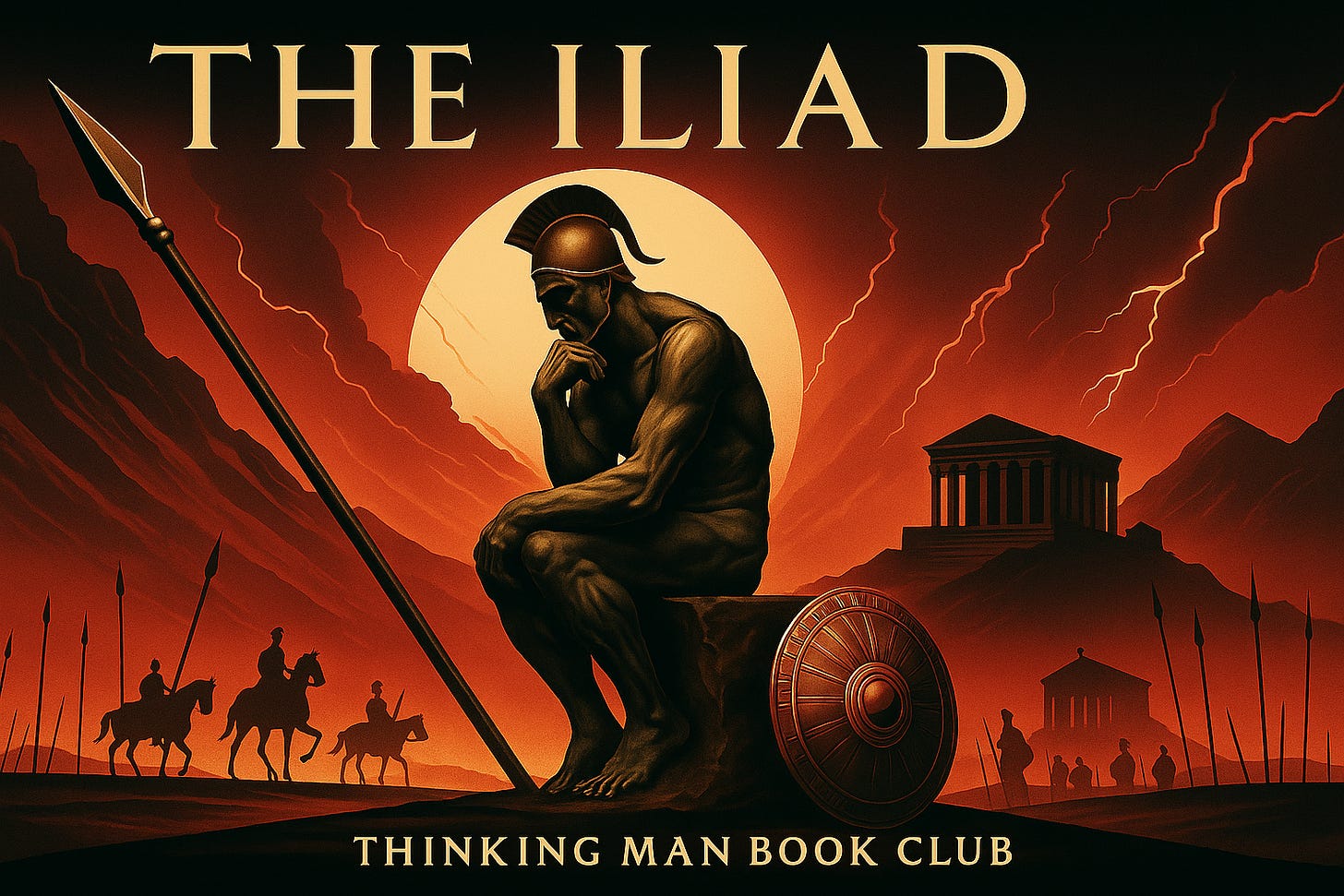We’ve made it to the end. The first installment of the Summer of Classics was an exciting one. I’m pleased to say that I enjoyed Iliad. Getting wrapped up in translations and ancient texts and the myths within the myths has always fascinated me, and this lived up to the hype. Outside of books 3 and 23, which contained a mind-numbing amount of character introductions and a questionable number of pages dedicated to funeral games, I was sucked into the world built by the poem. Maybe Homer (or, the Homers) were paid by the word. Hey, you never know.
The Iliad is the story of two heroes. Hector and Achilles were the driving forces of the story, with the former being my favorite character and a much more sympathetic one than Achilles whose name has stood the test of time far more than Hector’s has. While I read I found it hard to understand why the godlike Achilles was the focal point of the book. He acted like a brat for three quarters of the story and then went on a murder spree the likes of which most of us will never see in order to avenge the death of his best friend and murder the guy I’m sure most of us were rooting for.
After the candle I lit in memoriam for the fallen Trojan horse breaker burned out, I got to thinking. From the beginning of the ten-year war, Hector fought to protect his family and his city. Achilles fought for his own personal glory. While this may seem unheroic to us now, in his day and age it was what set great warriors apart. Achilles’ strength, bravery, and skill were what made him a hero.
As the ending of the book drew nearer, I waited to see the Trojan Horse in action, I was dying to see the epic description of Achilles finally getting it in his heel, and I was preparing to witness the utter devastation the Greeks left the city of Troy in.
I was shocked when none of that happened. Achilles made it to the end alive and well (minus one Patroculus), there was no hollow horse, and there were enough Trojans left to give Hector a proper funeral. What happened? Shockingly, to me at least, in the ten years of the Trojan War, the story contained in the Iliad only took place over the course of a few weeks. We don’t see the beginning, nor do we see the ending. All that bloodshed over a girl, with no closure. I had to Google what happened next, some of that information may shock you.
So, Achilles ended up getting killed by an arrow to the heel. Somehow, that arrow was shot by Paris. After all the buildup, Achilles gets killed by one of the least deserving characters in the book. The Greeks won the war, Priam was killed by Achilles’ son, and Hector’s baby was chucked off the wall. Those Greeks were ruthless! Perhaps the most shocking of all my findings was this: Telamonian Ajax (Ajax the Great) killed himself.
Huh? Yep. And boy does it get weirder. After the death of Achilles, Ajax and Odysseus tried to claim his god-given armor. Ajax, being the second greatest warrior in the Achaean army, believed he deserved it. However, Odysseus, being the sweet talker that he was (how else did he talk himself into not one, but two starring roles in Homeric productions1), managed to say just the right things to get the armor. This decision made Ajax thirsty for revenge. He decided to murder those who went against him, namely Odysseus, Agamemnon, and Menelaus. But before he could, Athena clouded his mind. He ended up killing a flock of sheep thinking they were the ol’ gang. When Ajax realized what he’d done, he became so embarrassed that he chose suicide rather than public shame. Ajax the Great, a major character who had more screen time in Iliad than Achilles, killed himself by impaling himself with the mighty sword Hector gifted him. I mean WTF! Sophocles’ earliest surviving tragedy Ajax tells this tale.
Iliad is a complex story that paints a picture of the Trojan War through the eyes of both the Greeks and the Trojans. By reading it, we get to see how truly ugly war is. The descriptions of the light leaving a dying soldier’s eyes as he is engulfed in the blackness of oblivion is powerful stuff, especially after reading that he has a wife and kid at home. It’s even sadder when you realize that what the two sides were fighting for was not even close to the worth of all the lives lost. Sadly, humans still haven’t gotten that part figured out.
At least we know one thing for sure—we can all agree that Agamemnon sucks.
Thank you for reading. If you enjoyed reading The Iliad with us, consider becoming a free or paid subscriber.
Stay tuned for the next Thinking Man Book Club pick: Homer’s The Odyssey.
Join us for the next Thinking Man Book Club pick: The Odyssey.





Excellent Recap John! It takes a very intelligent person to breakdown complex matters into simple to understand but enlightening points. As you noted nothing has changes - the monsters/psychopaths just have bigger weapons of destruction and they are considered "heroes".